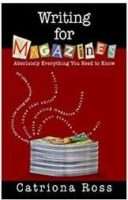Here’s what you should know about being paid while building your profile as a writer:
Payment for stories will vary according to each magazine’s circulation and profits, and your writing expertise and reputation. As a novice writer with just, um, two months’ experience, you’ll probably start off at the lower end of the pay scale while you prove yourself. Once you have some experience and a stack of magazine clips to show, you can negotiate and receive higher rates. At all times, though, you should ask for what you’re worth, based on your ability. For instance, it’s equally important not to undersell yourself if you’re experienced, respected and in demand as a writer: ask for a higher rate, and you’ll probably get it.
Balance your writing work in the initial stage of your freelance career. On one hand, it pays to take on lucrative, less interesting writing jobs that pay your bills every month. On the other, it’s important to offset this with work that makes your heart sing and boosts your profile, even if it’s not particularly well paid.
Mainstream titles with vast readerships offer you national exposure and good pay. Conversely, magazines with small circulations generally pay less than the popular titles, but writing for them has its benefits. Smaller titles often publish articles quickly, which means you’ll swiftly gather a stack of published clips. They’ll often accept work that’s less polished and less thoroughly researched than big-name magazines will.
Similarly, use your savvy when it comes to the length of the stories you write. You’re usually paid more for a longer piece than a little one-pager. And sometimes, you do the same amount of research for a 2,000-word piece as you would for an informative, fact-driven 600-worder. Is it worth your while to lavish research time on a short piece? At times it definitely is – when you’re building a relationship with a new magazine or features editor; when you need the money; when you’re a newcomer to the industry and need to get your byline out any way you can. Plus, you can expand your research into a longer piece with a slightly different angle and audience, and sell it on elsewhere.
Negotiate your fee before you start writing – but don’t jump the gun. Don’t talk money until the commissioning editor has expressed a solid interest in your story idea or actually commissioned you to write a feature. But make sure you’ve agreed on the terms of payment before you start writing the article.
Always ask for a written contract and brief once you’ve been commissioned to write a story. This ensures you and your commissioning editor are on the same page, and provides recourse for you if things don’t go as planned.
The contract should state the rights the magazine is buying, your rate of pay, the terms of payment (will you be paid on acceptance, on publication, the month after publication?), your deadline, and the word count for the particular story.
The brief should give a rundown of what’s required in the story, plus an order number for this particular job (though this is sometimes included in the contract) which you need to quote when you invoice.
Find out when you will be paid. Magazines differ in their terms of payment.
Those who pay on acceptance pay you when they decide to accept a story you’ve written. In reality, this often doesn’t mean you’re paid immediately. You may have to wait until their company issues payments, which could be up to a month later. Selling a story on these terms means you get paid regardless of whether your story is printed or not. And you don’t sit around waiting for your story to get printed so you can be paid.
Magazines who pay on publication only pay you after they print your story. So if your story languishes for months in the bottom of some features editor’s file, or the magazine goes out of business, or editors change, you’re a bit stuck.
It makes more financial sense to sell to magazines who pay on acceptance. And yet, many do only pay on publication, so if that’s the case, make sure these are reputable publications, and you include a clause stipulating that they use your story within a certain time period. When selling second-rights stories, it may be worth your while to approach pay-on-publication magazines: you can afford to wait for the money, and you open yourself up to more potential buyers.
Ask a writer: What’s your advice on making a healthy living as a freelancer?
‘You can’t be over-specialised; you need to write across a broad range of magazines, books and other media, and feel comfortable investigating just about anything. You also need to establish your rate, and re-negotiate this as you gain experience. Most important of all, though, is looking after your reputation. You can’t afford to go AWOL, miss deadlines, not communicate any problem as it arises, or submit weak, poorly-written, unproofed or boring copy. Any of these will tarnish your reputation and you won’t get enough work to make a healthy living. On the same note, you need to keep your journalistic integrity and always focus on serving your reader, not yourself. If you take freebies from pushy PR people and give them gushy, insincere copy in return, you devalue your voice and I doubt you’ll last long.’
Laura Twiggs, freelance writer and editor
What you should get paid
Payment differs from country to country, and magazine to magazine. Some pay per word; others offer a flat rate per feature. If you offer photos in addition to your text, you may be offered a fixed amount for the whole package. The Southern African Freelancers Association (www.safrea.co.za) recommends the following word rates:
Junior writers: from R2 per word
Experienced or senior writers: from R2,75 per word
Specialist writers: from R3,50 per word


